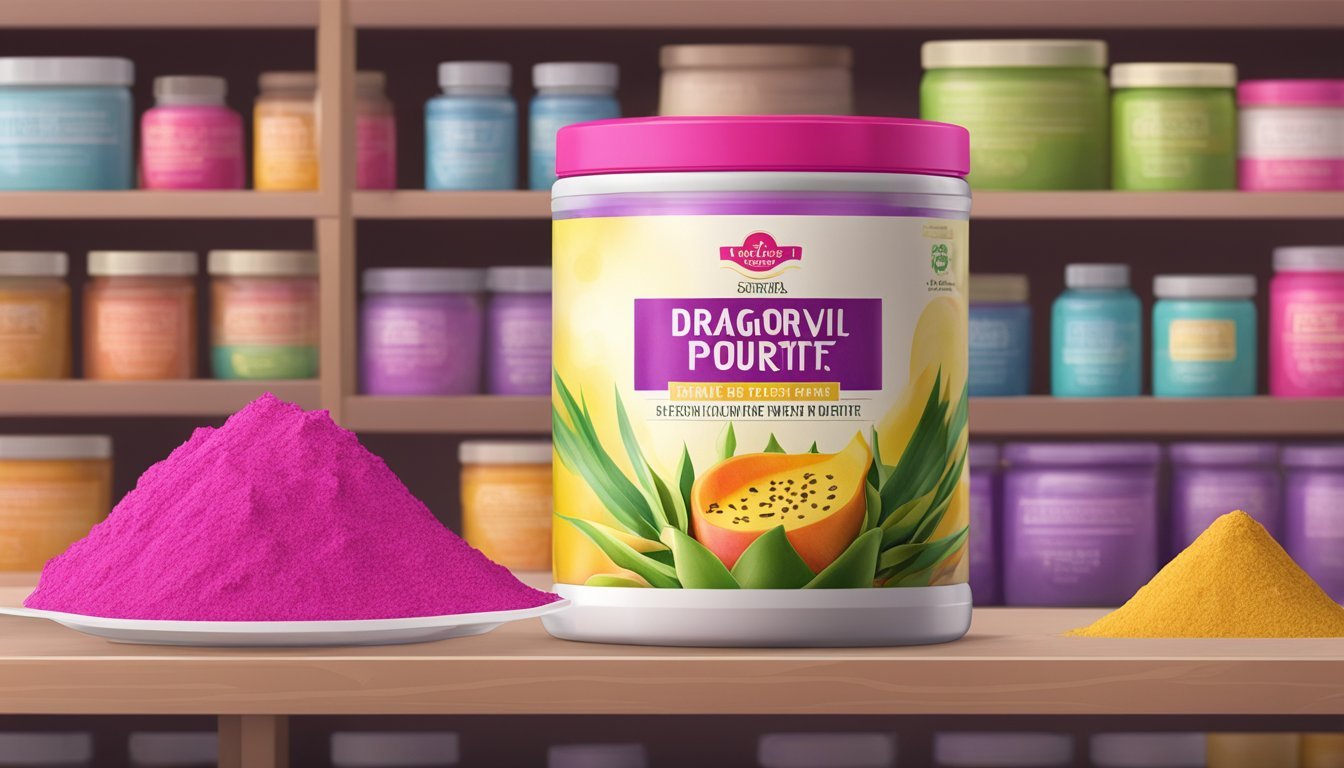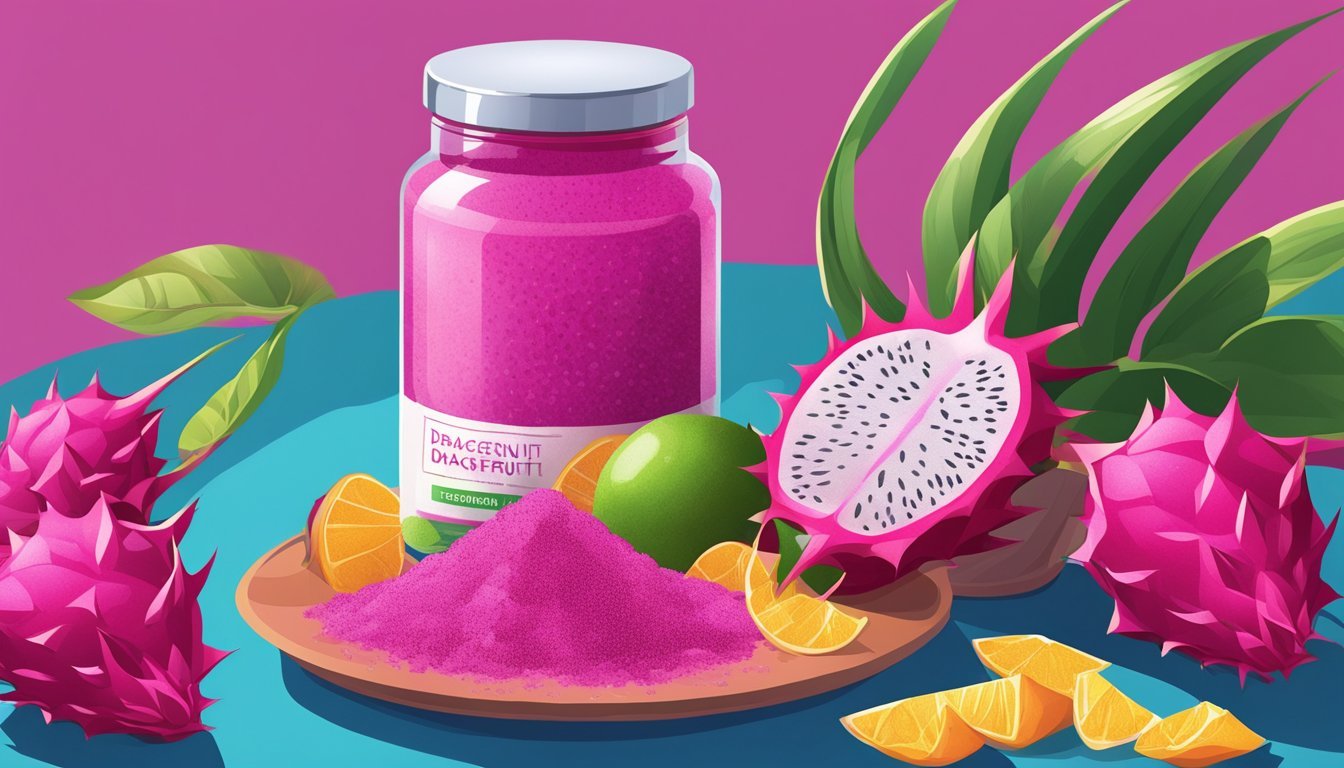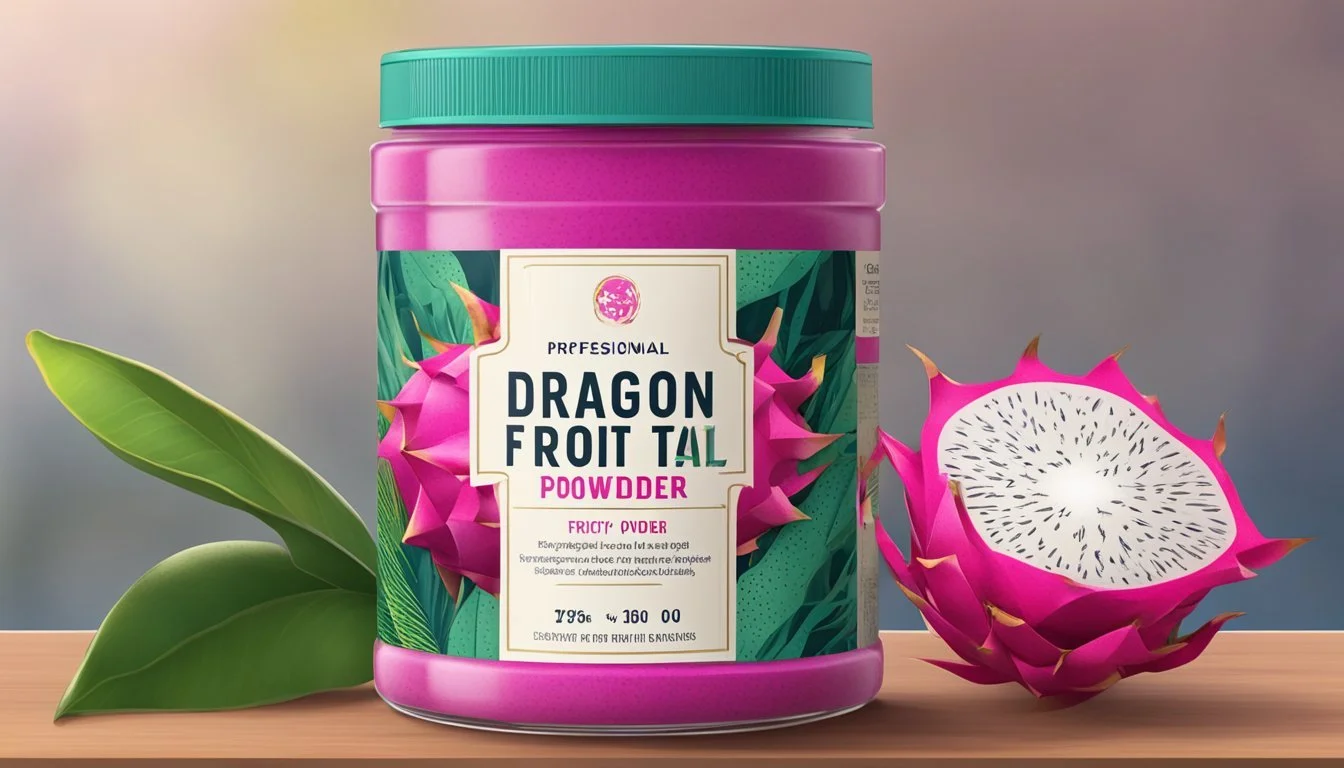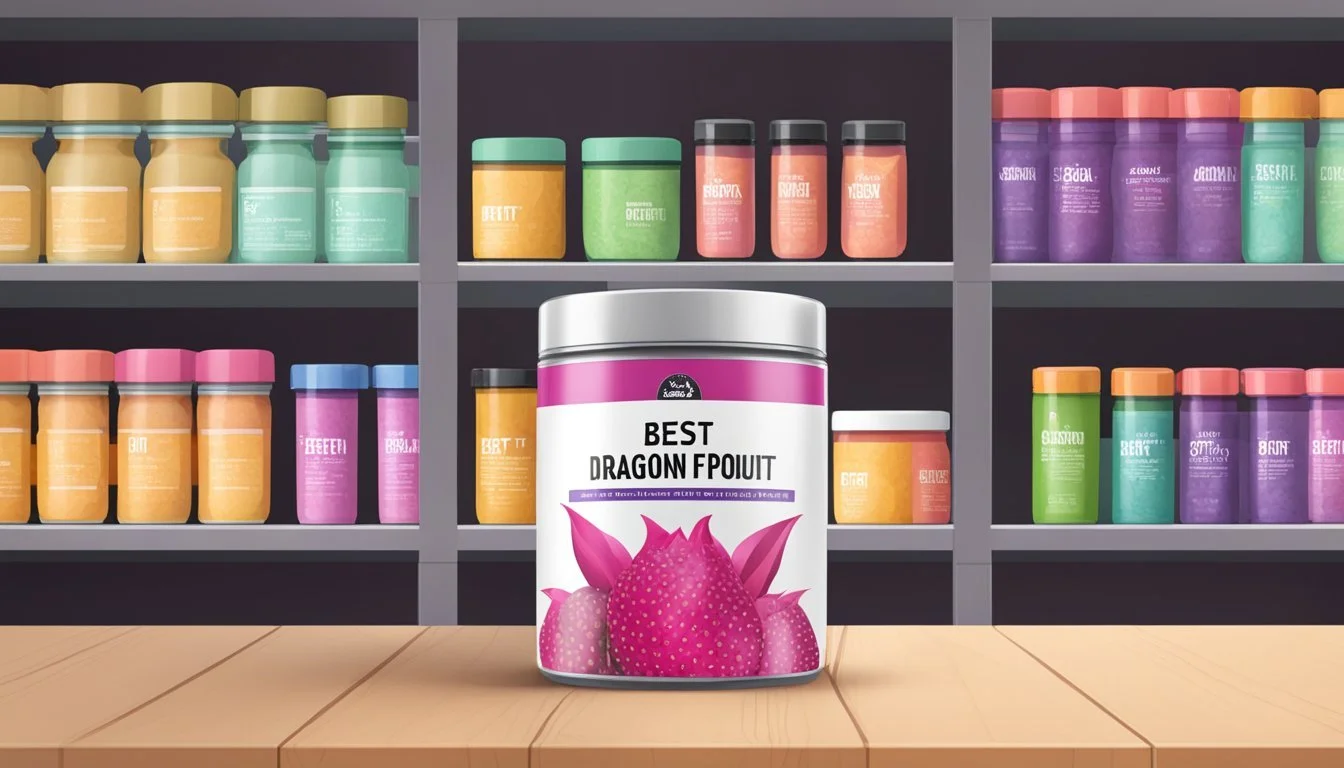How Long Does Dragonfruit Powder Last?
Shelf Life and Storage Tips
Dragon fruit powder is a dietary supplement embraced for its concentrated dose of the nutrients found in fresh dragon fruit. Made from the freeze-dried flesh of the fruit, including its skin, pulp, and seeds, it boasts a rich content of vitamins such as A, C, and various B vitamins, along with essential minerals like calcium, iron, and magnesium. It not only adds a vibrant color but also a nutritional boost to a variety of foods and beverages.
One common concern for consumers interested in maintaining a healthy lifestyle is the shelf life of their dietary supplements. The longevity of dragon fruit powder is influenced by multiple factors, including the method of processing and the conditions of storage. Ensuring the powder is kept in a cool, dry place, away from direct sunlight, is critical to preserve its quality and nutritional value.
Overview of Dragon Fruit
The dragon fruit, also known as pitaya, is a vibrant, tropical fruit known for its unique look and nutrient-rich profile. It is exotic both in appearance and in its origins, primarily grown in Southeast Asian countries, Central and South America, and Israel.
Identification and Varieties
Dragon fruit comes in three main varieties based on the color of its flesh and skin:
Red-skinned with white flesh
Red-skinned with red flesh
Yellow-skinned with white flesh
The fruit is typically oval to oblong in shape and features distinctive green scales that resemble a dragon, which is how it garnered its unique name. The most common variety is the Honolulu Queen, whose flowers only open at night.
Characteristics of Ripe Dragon Fruit
When selecting a ripe dragon fruit, buyers should look for a uniform color with slight give upon gentle pressure. It should be slightly soft but not mushy. The following characteristics indicate ripeness:
Presence of bright, even-colored skin without many blemishes
A slight fragrance that is sweet and inviting
Stem and scales that are lively green without signs of browning
Dragon fruit's taste is mildly sweet and is often compared to other tropical fruits like kiwi and pear. The taste is generally more pronounced in varieties with red flesh as opposed to white-flesh varieties.
Health and Nutritional Benefits
Dragon fruit, with its unique properties and nutrient composition, offers a range of health benefits. This section delves into the specific nutrients it contains and the associated health advantages they provide.
Nutrient Content
Dragon fruit powder, deriving from the whole fruit, is a concentrated form of various essential nutrients. Rich in vitamins A, C, and B, it also provides important minerals like calcium, iron, and magnesium, essential for maintaining optimal health. Due to its powdered form, these nutrients are easily accessible and can be incorporated into a diet more readily.
Vitamins: Vital for immune system function and skin health.
Minerals: Crucial for bone density, oxygen transportation, and enzyme function.
Health Benefits Associated with Dragon Fruit
Antioxidants present in dragon fruit powder play a crucial role in combating oxidative stress, potentially reducing the risk of chronic diseases such as heart disease and cancer. The fiber content supports digestive health, promoting regular bowel movements and may help in maintaining cardiovascular health.
Digestive Health: Fiber aids in digestion and may alleviate constipation.
Immune System: Vitamins and antioxidants contribute to immune defense.
Cardiovascular health: Some studies suggest fiber and fatty acids may lower the risk of heart disease.
Utilization in Food
Dragon fruit powder offers a convenient and versatile way to infuse dishes with a sweet taste and vibrant color. Chefs and health enthusiasts alike appreciate its ability to enhance recipes and diets while providing natural food coloring.
Dragon Fruit in Culinary Uses
Dragon fruit powder serves as a dynamic culinary ingredient, perfectly suited for incorporating into desserts and baking recipes. In such applications, not only does it impart a slightly sweet flavor, but it also adds a splash of vibrant pink or red hue, which enriches the visual appeal of food items. For those who enjoy the taste of fresh dragon fruit, the powder can replicate a similar experience, especially when used in:
Smoothies: A single spoonful can elevate the flavor profile and color of a morning smoothie.
Fruit Bowls: Sprinkling the powder on top of fruit bowls adds a delightful twist with extra fiber.
Yogurt: Mixing it into yogurt creates a nutritious and flavorful snack.
Salads: It can dress up any salad for those looking for a hint of sweetness without overpowering the fresh components of the salad.
It’s also a popular choice for a natural food coloring in various dishes, as it offers a bright, appealing look without the additives found in synthetic colorants.
Incorporating into Diets and Recipes
The addition of dragon fruit powder to one's diet is a straightforward process due to its ease of use. It seamlessly integrates into a range of recipes, providing nutritional benefits along with a burst of sweetness:
Oatmeal: A perfect complement to morning oatmeal, giving it a nutrient boost and a subtle sweet taste.
Baking: It can replace artificial colors in cakes and pastries to ensure a more wholesome product.
Smoothies: Not only does it enhance the taste, but it also contributes to a silkier smoothie texture.
Desserts: Many dessert recipes can be improved both aesthetically and in terms of flavor with a touch of this powder.
Salad Dressings: A hint of dragon fruit powder in dressings can offer an unexpected yet delightful sweet contrast to tangy lemon juice.
This powdered form of dragon fruit is an excellent way for individuals to eat healthily and enjoy the flavors of exotic fruit without concerns about the fruit's ripeness or shelf life.
Storage Guidelines
Dragon fruit powder, like many powdered products, retains its quality based on the storage environment it's kept in. Ensuring that it is stored properly extends its usability and preserves its nutritional value.
Optimal Storage Conditions
Storing dragon fruit powder correctly is vital to maintain its freshness. To achieve this, one should keep it in an airtight container to prevent exposure to moisture and air. Moisture can lead to clumping and potential spoilage due to the growth of mold. It's best kept in a cool, dark place like a pantry or cupboard, away from direct sunlight which can degrade its quality.
Store in an airtight container
Keep in a cool, dark place
Extending Shelf Life of Unprocessed Dragon Fruit
To extend the shelf life of an unprocessed dragon fruit, refrigeration is key. If one places an uncut dragon fruit in a sealed plastic bag before putting it in the fridge, this can help maintain its freshness for up to three weeks. Conversely, leaving dragon fruit at room temperature on the counter is suitable only if planning to consume it within 2-3 days, as heat and light accelerate ripening and potential spoilage.
Refrigerate in a sealed plastic bag
Consume within 2-3 days if at room temperature on the counter
Longevity of Dragon Fruit Powder
To ensure the lasting quality of dragon fruit powder, careful storage is key, and recognizing signs of spoilage is essential for determining its usability.
Proper Storage Techniques for Powder
Dragon fruit powder maintains its potency when stored correctly. Ideal storage conditions include a cool, dry place away from direct sunlight and heat. The powder should be kept in an airtight container to prevent moisture and air from altering its texture and nutritional value. Freezers are not typically necessary for storing dragon fruit powder; however, if one chooses to freeze the powder to potentially extend its shelf life beyond the typical expectation, it should be done so in a moisture-proof container to prevent clumping.
Signs of Spoilage and When to Discard
The longevity of dragon fruit powder is dependent on its ongoing quality, which can degrade over time. Signs that one should discard their dragon fruit powder include a noticeable change in color, scent, or flavor, which may indicate spoilage. Furthermore, the presence of moisture or clumps that do not disperse upon stirring suggests that air and humidity have compromised the powder. If these signs are evident, or if there is any doubt about the powder's condition, it is advised to err on the side of caution and dispose of the product to ensure safety and optimum health benefits.
Safe Consumption Practices
When consuming dragon fruit powder, individuals must be aware of potential allergic reactions and adhere to safety guidelines for handling and preparing dragon fruit to ensure safe consumption.
Recognizing Allergic Reactions
Allergic reactions to dragon fruit are rare, but they can occur. Symptoms might include itching, hives, or swelling. When trying dragon fruit powder for the first time, it is crucial to start with a small amount to monitor for any adverse reactions. Those with known allergies, especially to other foods in the cacti family, should consult with a healthcare provider before consuming dragon fruit products.
Safety Tips When Handling and Preparing Dragon Fruit
To minimize health risks, always wash the ripe fruit thoroughly before cutting it to prevent dirt or bacteria from transferring to the edible parts. When preparing fresh dragon fruit to create powder:
Ensure the fruit's color is bright and even, indicating that it is ripe.
Confirm that the black seeds are present, as they are indicative of a genuine dragon fruit.
Cut dragon fruit into small pieces to facilitate even drying if making homemade powder.
Use dragon fruit as a natural food coloring, but always verify the quality before use.
When handling either the fruit or the powder made from the fruit, one should keep surfaces and utensils clean to avoid cross-contamination. Additionally, using ripe fruit guarantees optimal flavor and nutrient content for the powder.
Dragon Fruit in Various Dietary Contexts
Dragon fruit, also known as pitaya, is a low-calorie tropical fruit that is rich in dietary fiber and offers a gamut of nutrients beneficial for various dietary contexts. As it hails from the cactus family, it stands as an exotic addition to the diet that is both nutritious and versatile.
Inclusion in Special Diets
Dragon fruit is particularly favorable for special diets due to its low calorie and high fiber content. For individuals monitoring their caloric intake or seeking weight management, the ripe dragon fruit offers a sweet taste similar to a blend of kiwi and pear but without a high-calorie count. It fits seamlessly into vegetarian and vegan regimens, providing a burst of color and nutrition with every serving.
Gluten-free diets can also benefit from dragon fruit, either fresh or in powder form, as it does not contain gluten and provides a healthful alternative to other fruits that may be higher in sugar, such as bananas. Those looking to enhance their gut bacteria and maintain a healthy digestive system might also consider incorporating dragon fruit for its fiber that aids in digestion.
Synergy with Other Foods
When combined with other foods, dragon fruit demonstrates a notable synergy, especially in smoothies and baking recipes. Its subtle sweetness allows it to blend well with the creamy texture of milk or the natural sweetness of honey, enhancing flavor profiles without overwhelming them. This makes dragon fruit powder an ideal ingredient for smoothies, providing both color and a nutritional boost without significantly altering the taste of other ingredients.
In baking recipes, the powder can replace some flours for those with special dietary needs, contributing to the final product's nutritional value by adding fiber and vitamins. Moreover, including dragon fruit in one's diet can help combat fatigue with its vitamin and mineral content, and the use of its extract in topical products is believed to benefit hair health, though these applications venture beyond dietary contexts.









